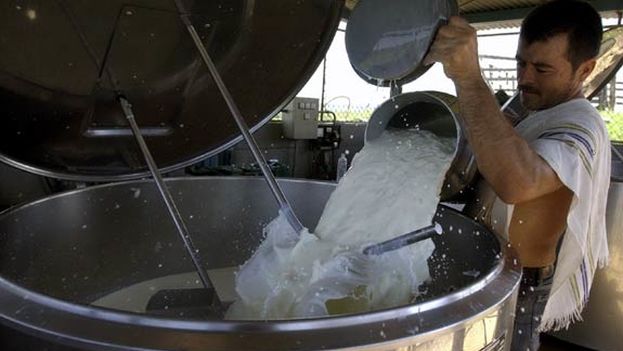
![]() 14ymedio, Osniel Carmona Breijo, Guines, 3 December 2015 – “Anyone with more than five pepinos [the liter-and-a-half plastic bottles that are standard for homemade yogurt] can get off now.” This phrase, according to Nereida, a 61-year-old seller of illegal yogurt, serves the police as their “calling card” when they stop public transport for an inspection.
14ymedio, Osniel Carmona Breijo, Guines, 3 December 2015 – “Anyone with more than five pepinos [the liter-and-a-half plastic bottles that are standard for homemade yogurt] can get off now.” This phrase, according to Nereida, a 61-year-old seller of illegal yogurt, serves the police as their “calling card” when they stop public transport for an inspection.
Agents from the Ministry of the Interior’s different departments in Mayabeque province, in collaboration with inspectors from the Fishing Industry, have heightened their vigilance in recent months against underground sellers of fish and yogurt.
Self-employed people are forbidden to trade in these products, as they are in beef, coffee, honey, tobacco and cocoa, by Decree Law 318, which requires these products to be sold only to the State through existing contracts.
However, economic difficulties push fisherman and dairy farmers to look for alternatives in the underground market. On multiple occasions they end up facing stiff fines and risk the confiscation of their merchandise.
Orlando Cuevas, a farmer in the village of El Sopapo in the Batabano district, says that there is “nothing written, but if you don’t give the milk to the government, they slap you with a fine and can take away your animals. It is an outrage, and on top of that they pay you less than three pesos a liter, depending on the quality of the milk, when private buyers never pay less than five pesos.
Many farmers, to evade their commitments for the milk and to increase their earnings, don’t declare their entire production and make it into yogurt, which they then sell to street vendors. However, the police controls limit the number of containers of the product a person can transport.
The agents stop the vehicles and search the belongings of the passengers, mainly on public transport. According to the testimony of Nereida, on every trip the authorities detect some passenger outside the regulations. As a punishment, they impose fines of between 200 and 800 pesos, and seize the yogurt containers.
The controls can be mocked thanks to the solidarity of other travelers. “We look for people who are traveling who aren’t carrying anything and we distribute the yogurt among them, so that it’s within the regulations. When it goes badly and they catch us, we get off but we take off the lids and empty all the bottles, because they are going to take it from you anyway and fine you. If you leave it they get it,” Nereida adds.
A sergeant of the National Revolutionary Police (PNR) said that the seized yogurt is consumed in children’s homes, maternity homes and old people’s homes.
As for fishing, since October the PNR has intensified its searches on roads that provide access to fishing villages, in the homes of non-state fishermen, and in the homes of presumed recipients.
In a recent operation in the area known as “Playita” (Little Beach) in Surgidero de Batabano, PNR forces and local Fishing Industry inspectors intercepted a “smuggling operation.”
According to Yunior Castellanos, a local resident, the authorities seized about two tons of fish and half a ton of lobster. The boat used in the transfer was seized and the three fishermen and five receivers involved were detained. Some others managed to escape through the mangroves.
In other localities such police actions are also reported. A fisherman from Cajío village, who preferred not to be identified, said that the sale of seafood declined in recent days due to the authorities’ harassment of fishermen and street vendors.
The strict operation has included the inspection of private boats at sea. “They intercept you on the pretext of looking for people leaving the country illegally, and search the cargo,” commented a fisherman. “If there is a lot, you have to show the licenses and contracts to be able to justify it. If you don’t have them, they take your load, fine you and you have to complete a ton of paperwork to get your boat back,” he says.
The problems don’t end there. “After you dock, you have to get rid of it, because the police inspect every car on the road to the village, coming or going. The sellers don’t want to risk it.”
The focus of the searches and arrests also extends to Santa Cruz. José Víctor Fresneda engages in sport fishing there, and takes the opportunity to sell what is caught. According to Fresneda, last 19 and 24 November, the PNR conducted a series of raids on the homes of citizens engaged in selling fish.
As a result, he says, there were two people detained, where they found “quite a few pounds of fish, mostly frozen.”
